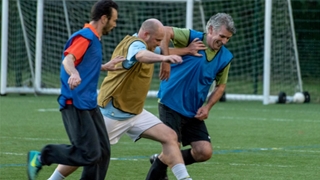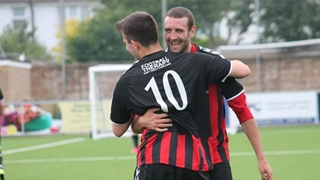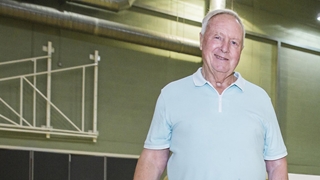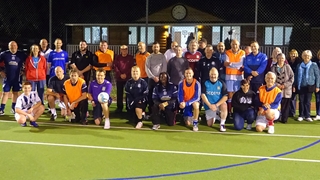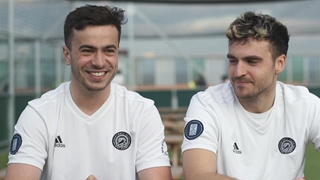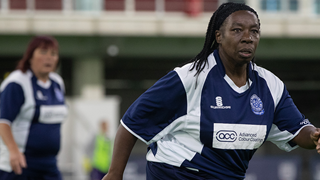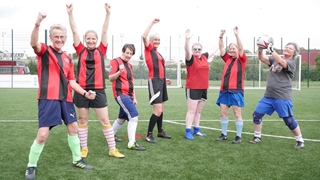
Lewes FC are known for their unwavering commitment to equality.
Based in a charming Sussex market town, with a population of just 17,000, the so-called Rooks are the only professional football club in England to pay their male and female players the same – a campaign they call ‘Equality FC’.
But gender equality is only one part of Lewes’ goal of equal inclusion and opportunity, which defines the club at both elite and grassroots level.
A spin-off from Equality FC is ‘Oldquality FC’ – a veterans’ team founded to promote mental and physical health.
Lewes cater to over-35s in three distinct ways. There are eleven-aside and walking football teams and, perhaps most innovatively, a football therapy session every Thursday, specifically targeting men of all ages with depression or anxiety.
“As a fan-owned club, it’s really important we provide opportunities for all members of the community,” explains women’s general manager Maggie Murphy, who also trains with the veterans team.
“Our football therapy sessions are a space for male footballers to come along and play football without any fear or pressure. We have counsellors on the side of the pitch and our players are able to find a bit of respite and solace through football.
“We also have a full football programme for veterans on our 3G all-weather pitch for men and women over the age of 35.
“And then there is our women’s walking football team, who train every Tuesday. This is for women who may have never tried football before or perhaps weren’t allowed to play as kids. Some of our players are in their 70s.
“Each of these elements form part of our broader strategy to show that football has so many positive health benefits – both mental and physical.”
Lewes’ commitment to mental wellbeing is mirrored by our own Heads Up campaign, which has been running at all levels of the game this season and uses the influence and popularity of football to underline the importance of mental fitness.
Heads Up – backed by Royal charity Heads Together – is especially relevant during the festive period, which can prove challenging for those prone to, or suffering from, mental health issues.
Peter Bull founded Oldquality FC having suffered from mental health issues as a teenager. The 41-year-old is now a trained psychotherapist and structures his training sessions to have a therapy-feel.
“Oldquality FC is about bringing the community together,” says Bull.
“A lot of football groups that exist for older players are quite traditional and perhaps a bit macho. We have mixed training sessions and nurture both a passion for football and friendships.
“As a trained nurse and psychotherapist, I’ve introduced certain therapy elements. For example, Friday night training starts at exactly the same time, which motivates players to get out of the house, and we always read a special poem before we kick off, which underlines one key message: if you’re old enough, you’re good enough.”
“When I first heard the poem, I thought it was a bit of a joke,” adds Murphy.
“But it just kept being read session after session and eventually resonated with me. The very last line says, “If you’re old enough, you’re good enough” and everyone joins in. It’s such a powerful statement.
“It’s all about throwing off whatever might be going on in your outside life to come together and play football. It’s such an inclusive atmosphere, and we always end up going to bar afterwards, too. Oldquality FC really is a credit to the club.”
While some veteran teams struggle for numbers, Oldquality FC have over 50 players and play around 25 fixtures per year. The aim, naturally, is to win, but just as importantly cultivate an environment where psychological ‘injuries’ can’t happen.
“I’m autistic, so fostering relationships doesn’t come naturally to me,” admits Bull. “What I like about football is I don’t really have to talk. The rules of the game are clear and I can share the field with others without feeling anxious or engaging in too much dialogue.
“For those suffering from mental health issues – like loneliness, which can be so prevalent at this time of year – our veterans’ team is a safe space where you don’t have to talk and can just relax and de-stress.
“Of course, if you have mental health problems, you still need to find a way to share your feelings and be vulnerable and I think men struggle with this.
“So as the nights draw in, and it gets colder and colder, if talking isn’t for you then playing football can be the first step to improvement. Just getting some exercise for 20 minutes will make a big difference because there is no mental health without physical health.”
Our Heads Up campaign runs throughout the 2019-20 season at all levels of the game.


